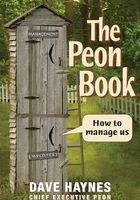Welcome to the world of the peon. Please keep your hands and arms in the car, and make sure that your seat backs are in the vertical position. Pregnant women and people with . . . weak constitutions should sit this one out. The view of the world through the eyes of a peon is not always a clear or peaceful one, but it is the key to your success as a manager. My intent is to help you transform yourself into a better leader by letting you know how we peons think and what we expect from you.
In order to make a successful transformation, though, you and I are going to have to establish some ground rules. First, I promise to be completely honest with you, that I will not hold anything back. I also promise that I will not just diagnose problems but also will give you solutions to those problems. I promise to keep the book as entertaining as possible for a business book, and I promise to give you real suggestions that you can use in your job today.
In return, I expect a few things from you. First, I expect you to be open-minded. Yes, I am a peon, and yes, my clothes are less expensive than yours, and no, I don't have a talking GPS system in my car, but you still might learn something from me. Second, I expect you to be honest with yourself. Nobody is here except you and me, and I want you to be honest in your self-assessments. Third, I expect you to laugh. Don't take my jokes too seriously—I don't. Finally, I expect you to do something with these suggestions. If you are just reading this to appease someone else, then put it down and go back to riding your NordicTrack. I want you to plan to get something out of these suggestions that will help you be a better manager.
Now that we are on the same page, ready to help you be a more peon-friendly manager, the first thing we need to address is your personality. I am aware that changing personality traits is like jamming toothpicks under your fingernails. I realize that we all read books that tell us “be a better listener” or “be your own motivator”—things that are easier said than done. We are who we are, and reading some stupid book isn't going to change who we are, is it?
No, a book is not going to change you, but it can point out some traits to refocus. I know what I just said about the toothpicks, but stick with me. If certain personality traits aren't established as the basis of our new, managerial you, then the rest won't work. In the words of Jesus, quoted in the Gospel of Matthew, it will be a house built on sand that, when the rains come, will wash away.
In order to identify traits that need refocusing, it is important to point out that the two quickest ways to offend or insult another person are either to disrespect them or to deceive them. These can be very difficult offenses to forgive; in fact, in some cases, such behavior can lead the offended party to much more serious offenses, in retaliation. This book as a whole focuses on point number one; this chapter is about point number two.
Therefore, the first and most critical managerial trait is to be trustworthy. Any good relationship is established on a basis of trust: husband and wife, parent and child, manager and employee, CEO and investors. Trustworthiness is a significant personality trait; it is the glue of a relationship and it is the bond that makes a group a team. Trust is critical to the success of any personal or professional relationship, and if you want to get your employees to do anything, then they'd better trust you. Deceit is the fastest way to lose the respect of your peons. They will not be motivated to work for you if they do not trust you.
Trust is a funny thing, though. It is so easy to damage, and so difficult to repair. This funny world with all of its funny crooks and all their funny ideas have made us all a little gun-shy when it comes to trusting others. Many managers assume that because they occupy a management position, people will automatically trust their judgment and look to them for leadership. As though just by placing the mantle of leadership on their shoulders they become a different person, and suddenly their subordinates trust them completely. Such an assumption is like assuming that simply because someone has a driver's license they should be trusted to drive your car.
We peons respect you as a manager because of your authority, but that doesn't necessarily mean we trust you. In fact, to most employees, the mere fact of a manager's ascension up the corporate ladder makes them about as trustworthy as the company's legal department. A manager can be trusted, but many elements other than just a title must be present. A title may get you respect, but it does not earn you any trust.
So your peons don't trust you—so what? No big deal… neither do your in-laws. Life moves on, right? Consider, however:
Peons will only follow a leader wholeheartedly if they are completely confident in the promises made by that leader.
An employee will hardly be confident in your promises if they mistrust you. I think every manager dreams that when they order their team to jump the unanimous response is “How high?” However, if your employees don't trust you, their response will be more like “Is there really any reason we need to jump? What if we hurt ourselves? Is this in my job description?” Peons won't have confidence in your vision if they don't trust you. A prospective shareholder won't have confidence in their stock purchase if they don't trust you. A prospective spouse won't have confidence in your plans for the future if they don't trust you.
Central to your new focus must be a desire to develop the trust of your peons. What have you done lately to gain their trust and confidence? Further, what have you done lately that may have violated that trust, even something that may not have affected your peons directly—something such as lying, cheating, or failing to keep a promise? If you want peons to follow you, be trustworthy. When we trust you, we will be confident in you and willing to follow you, because we won't fear that you are leading us in the wrong direction.
Years ago, I worked for a small manufacturer, selling water purification equipment for people's homes. Many of the salespeople in this field had come from the old school of door-to-door selling. Their sales philosophy consisted of a quick message, very little information, all kinds of promises, and some Zig Ziglar close to wrap up the deal. This type of sales-person never worried about future customer service; instead, it was “get the sale, get the praise, and get the commission.” In other words, their professional behavior was successful but untrustworthy.
One of these old-school guys was a seasoned salesman who felt that he could sell pretty much anything to anybody, anytime. Within weeks of joining our company, he began selling the socks off every other salesperson. His commission checks were three times the amount of anyone else's; he was making some great money.
I started to watch him closely, to see what I could learn, because I wanted to make that kind of money. I noticed that he kept no real record of his customers and engaged in no follow-up. I didn't understand it. How could he care so little and yet sell so much? So one day I stopped him and asked him to enlighten me. His response was that his basic pitch was always the same, and that the point of the pitch was to give the customer enough information to know the general product they were buying, but nothing more. He felt letting a customer know too much was dangerous. That didn't sit well with me, but my opinion didn't matter; he was happy, the boss was happy, everybody was making money, so that was success, right?
However, I could sense the eventual backlash from this type of selling: the buyer's remorse and the increased customer expectations resulting from inflated promises, not to mention the ethical dilemmas presented by working this way. But the boss was so impressed by this guy's work that he basically demoted the current sales manager and gave Mr. Performance the job.
I didn't like this setup, so I went in to talk to the boss.
“Boss, I don't like Mr. Performance as my sales manager.”
“Why not?”
“Cause I don't trust him.”
“Neither do I, but he's making this company a ton of money.”
“Maybe so, but don't you see that this is going to come back and bite you in the butt?”
“What am I supposed to do? The other sales manager isn't doing a good job motivating you, and—”
“And you think this guy is going to motivate me? Motivate me to look for another job maybe.”
“Fine. Go look for another job. This is the way it is.”
As a result, I did start job searching, and when the right opportunity came up, I left.
Think about the ramifications of having an untrustworthy manager at the helm. Not only did he set a bad precedent for the company, but he also managed to demoralize the rest of the workforce at the company, beginning with me. My poor wife had to hear me rant and rave over dinner about this untrustworthy manager. My poor computer had to feel my anger when I typed up my résumé in disgust. My poor customers had to learn every minute detail about our product because I didn't want to be anything like that guy. I felt that if the man was shady with his customers and didn't seem to mind the ethics of the way he dealt with them, what was supposed to make me think that he would be honest with me?
Honesty and integrity are not switches that you can just turn on and off.
I was his direct subordinate, but I wasn't the only one who felt demoralized by having an untrustworthy manager at the company. The guy who worked in production hated his job because this shady manager made unrealistic promises to customers. The guy who installed the water systems hated his job because when he went to a customer's house he had to deal with angry customers who felt they had been finagled. Thus, one manager's dishonest, aggressive behavior affected everyone, even people who were not his direct subordinates. Ironically, this “improvement” was initiated to help the company, because he was the one responsible for bringing in tons of money and helping the company to “succeed.” Instead, it was eating the company apart from the inside out.
In this case, employees were frustrated with the unethical behavior and, more importantly, disconcerted by the implied message that if we wanted to advance in the company we needed to be like Mr. Performance. A peon's hands really feel tied when you realize that you won't be promoted based on your talents or skills, but rather, on your ability to bend the rules and cheat.
How is your management affecting your company? Is your company being eaten apart from the inside out because of you? Are your people going home, boring their spouses, and pounding out résumés because they can't stand being around you?
Mr. or Ms. Manager, look at yourself. Really look at yourself. Remember, you promised you would be honest with yourself. Do your people think you are honest? Now really think about this. Have you ever given them a reason to trust you, or to mistrust you? Does your behavior with your employees, other workers, and customers suggest integrity, or does it reek of dishonesty?
Do it for the Peon
If this is an area that needs a little work, where do you get started? How do you get your people to trust you? I promised you solutions, right? Well, now I am going to deliver on that promise. See, you can trust me. The first step to becoming more trustworthy is to be dependable, loyal, and steady. Think about the most trustworthy person you know. What is the first character trait that comes to mind when you think of that person? Probably something related to the fact that you know that their behavior will not change. For instance, you could reveal to them extremely confidential information and their behavior remains exactly the same, as if they had never heard it.
Imagine you are about to take a daylong horseback-riding trip, and you are given an option of riding one of two horses. The first horse is an old, reliable horse guaranteed to give you a safe, enjoyable ride with no surprises. The second horse is a bit of a hothead. His behavior is very sporadic. Sometimes he just does what he feels like doing and may take you miles off the beaten trail. Which horse would you choose for the ride? I am going to guess that most people would rather have the steady, trustworthy horse. The most desirable element of that horse's personality is that you can trust it because it is steady and unchanging.
So, the first element of being trustworthy is being steady and unchanging. Okay, that is a good trait over time, but how can you work to gain the trust of your peons today? The best way to gain trust is to do something for someone for which there is no apparent personal reward in return. If you are a direct manager, this could entail something as simple as taking an employee out to lunch or remembering their birthday. If you are an upper-level manager, it could be something as simple (and as complicated) as remembering a peon's name. Trust can be gained by doing things that only benefit the employee.
During the middle and latter part of the 1990s, I—like 99.87% of the U.S. workforce—had visions of making oodles of money through the Internet. I calculated that the ability to design and put together a Web site would be a very valuable job skill. At the time, a friend of my wife's owned a small shop that sold competitive swimsuits. Through conversation with my wife, this friend learned that I aspired to Web design and asked if I would put together a site for her small business. I appreciated her inquiry; however, I had to decline because at that time I did not yet know how to do what she was asking. She responded by giving me an opportunity to learn: “I'll pay you to learn while you make my Web site.”
I couldn't believe it. She was going to pay me, by the hour, to learn how to design Web pages, and all I had to do in return was to design hers. It was difficult for cynical old me to figure this out. Sure, she would get a Web site out of the deal, but it would cost twice as much—and probably take ten times longer—to have me rather than a professional do the work.
The thought kept crossing my mind: “Why is she doing this?” I could not come up with a better explanation than “she just wants to help me,” with no overwhelming benefit to herself. Once I concluded this about her motives, I can't overstate just how motivated I was to avoid letting her down. I wanted to work twice as hard, to learn quickly, and to make her Web site top-notch. As time went on, she continued to do unselfish things for me, which in turn built up my trust in her.
Trust can be a very valuable asset in your quest to win the hearts of your peons, and you can do many little things that will earn trust. For example, extend the branch of trust and, on days when productivity has obviously become negative rather than positive, let people go home early. It is a small gesture that has no apparent benefit to you, and that can help to build the trust of your peons. Such days might include Christmas Eve or the day before Thanksgiving or some particularly nonproductive Friday right before a three-day weekend. Let everybody go early—confuse them by doing something that carries no obvious benefit to you.
What crosses the mind of a peon when you act in this way? At first, we say to ourselves, “What is she gaining from this?” If we can't come up with an obvious answer, then we say to ourselves, “Okay, what does the company gain from this?” If there is still no obvious answer, then our final conclusion is, “Hmm, that is a really nice thing to do. Maybe she really is just a normal person.” When others see you as a normal person, they see you as a more trustworthy person. It starts to break down the divide between managers and peons, and the trust gets built as you become a member of the One of Us club.
It has always amazed me that most managers neglect the opportunity to build trust by letting people go early on nonproductive days. Maybe you considered it but felt too afraid of your own boss to lay down a decision. Come on! What happened to all those posters of eagles and fog-covered golf courses with inspirational quotes about “controlling your destiny?” Do you really believe that you control your own destiny? Then act like it. Make the decision.
Really, such a decision should be a no-brainer, particularly in the case of employees in noncritical positions. While I realize company policy may be to only get the actual holiday off, the fact is that if people haven't already taken the day off, they are just coming in to fill their time so that they don't waste another vacation day. Sure, maybe you keep some technical people there to make sure the computers stay running – and a security guard or two – but most people in accounting or marketing or sales come in to the office and get very little done on the day right before a holiday.
If I'm not working, then what is the difference between not doing it at home and not doing it in your office?
And don't pat yourself on the back if you let your people go at 4:30 instead of 5:00. I'm talking noon—2:00 P.M. at the latest. Or just give your peons the day off. Don't ask permission from your vice president; you have my permission. This has to be something nice you do for your people, and which has no benefit to you. That is how you build trust: surprise your peons. Make them question your motives. Make them search for a reason behind your actions. Make them come to the conclusion that maybe you are just a normal person. Before long, they will see that you are a normal, trustworthy person who belongs in the One of Us club.
Communication
Another very important way for you to gain the trust of your employees is through constant, open communication. Don't duck the issue by saying, “Well, I have told them that my door is always open.” That is not communication; that's a cop-out. If you want to be a manager that communicates well, understand that communication means clearly explaining everything to your employees, and ensuring that they understand you completely.
The fact is, if you don't tell them everything, they will make up their own stories, and chances are those stories will be wrong.
24
In the absence of any way to discredit them, your employees will believe any fabrication.
For example, imagine two employees are walking down the hall. They see their manager walk into his office with the manager of Human Relations, close the door, and spend over an hour in there. Employees are usually pretty creative. Their minds can come up with any number of explanations for this occurrence. Here are some examples:
He is having an affair with the lady from HR.
They are planning mass layoffs and are just checking what they have to do first.
They are checking to see how many sick days I have taken over the past ten years, because they are looking for a reason to fire me.
He embezzled a bunch of money and they are on to him. Great! Now my 401k is worthless.
Now, the actual scenario may just be that the manager's wife became pregnant, and he wants to make sure he understands all the benefit plans ahead of time. Nonetheless, a lack of facts will not stop employees from making something up. Until the manager tells them otherwise, they will believe whichever scenario they prefer.
So how does the manager avoid rumors? Obviously, it would be impossible for a manager to explain every action, but managers should try to put themselves in the shoes of their subordinates and to identify which situations might need some explanation. All it may take is mentioning to one team member, “Hey, I was speaking with the HR person today about the upcoming birth of my baby, and our company has some pretty good coverage.” Believe me, word will get out.
A manager should strive to communicate everything with employees. Obviously, some things should not be shared, for legal or other reasons, but for the most part, most of the information you currently choose to withhold from your peons could be shared with them without any penalty.
When I worked for a medium-sized Internet company, my direct manager was great about communicating. If somebody from our team left the company or was fired, he brought us all into a meeting immediately. Before we were able to create our own theories about why that person left, he would explain the situation to us from his perspective. This approach was critical to diffusing any negative sentiment toward him or toward other managers. Once we heard his story, we would say to ourselves, “Okay, that makes sense from a business perspective. My job is not in jeopardy for now, so I won't worry about it.”
This is quite a contrast with other managers I've worked with, who fire someone, let security escort the former employee out the door, and then lock themselves in their office and wait until everyone leaves so they don't have to confront potential backlash. Had my good manager never taken the time to communicate it to us, our minds would have been filled with wild theories:
26
He got fired because he and the manager had that one disagreement.
She got canned because they are starting to cut back the workforce, and I'm probably next.
I bet he got fired because he took an extra fifteen minutes on a couple of lunch breaks. I do that once in a while too… I'm dead meat.
This is the way the peon mind works. If you doubt that your subordinates draw conclusions without proper information, watch yourself do the same thing the next time you drive by a rush hour fender bender. As you come up on the mangled autos, you immediately try to create a scenario to explain the different dents and the pieces of glass on the ground. You look at the skid marks, you check to see if you know any of the people involved, and you draw conclusions about what happened and who was at fault.
I know it sounds grotesque, but it's true. Traffic can be delayed thirty extra minutes just because all of us morons have to slow down and create the scenario in our minds. I'm sure that for many traffic incidents, the number of possible scenarios created is the same as the number of cars passing. This isn't unlike peon-contrived scenarios about managers at work. We see an odd scene, we look for clues, we only find a couple of clues—but we come up with a theory anyway.
Sure, it would be nice if your employees would just come up to you and ask. That's what the open door policy is for, right? Unfortunately, that is like going up to someone to tell them they have a booger hanging out of their nose. If the peon doesn't trust you or isn't confident you trust them, they won't bring it up.
Managers, please take the time to communicate to your people about everything. Put yourself in their shoes. Once you get the information, figure out what part they need to know and pass it on to them. Be open with them about everything. It will help you build trust and it will avoid any confusion about your motives.
Two-faced
Now, don't assume that just remembering somebody's name, giving them a couple hours off, or telling them why another employee got fired will earn their trust for life. As I stated earlier, trust is a funny thing. You must earn it, and you must continue to earn it. More than anything, however, you must do everything in your power to avoid betraying that trust.
So, just how does one betray and lose the trust of others? In my experience, it tends to be the actions that make you appear two-faced that are the most damaging to a bond of trust. What do I mean by two-faced? Exactly what it sounds like: Putting on one face for one person or situation, putting on another face in another situation.
Trust is lost when someone finds that the person they trusted was actually a “face” or a fa?ade. For example, when my wife and I were courting, I successfully convinced her that I was a clean, well-mannered, polite man. Not long after the wedding bands were exchanged, though, I removed that face and showed her the real me—as many people do in marriages. Pretty soon, she was forced to change her own oil, open her own doors, and watch football instead of beauty pageants. Luckily, I am blessed with a wife who was able to see the new face and to trust me just the same. Many employees, however, are never able to work around a manager's betrayal of trust.
How many faces do you have? How many faces do other people see in you? Do you wear the same face for everyone? Do you wear one face for the customer, a different face for the CEO, and yet another for your friends and family? Or are you comfortable with yourself to the point that you can be yourself in all situations, without having to be dishonest or compromise your integrity?
Think about situations where this can come up in the workplace. Imagine a manager who one day tells an employee what a great job they are doing, and states that the employee is right on track for promotion, and then gives that employee a written reprimand for poor work performance a week later. Consider a manager who has no problem rewarding a top performer with plaques, yet is hesitant to recommend that same person for a promotion. Such actions break the bond of trust between not only that peon and the manager but also between the manager and every other peon within earshot, who hears the story of the peon.
Another, subtle example of being two-faced is the manager who fails to follow through on promises or threats. I once worked under a manager who sent all-staff e-mails every Monday, telling us, basically, to double our output and reduce our downtime or find another job. Every Monday. We knew it was coming; it didn't surprise us. Yet nothing ever came of it. By Tuesday, everything he requested or threatened was forgotten, and we went about our business as usual.
We attributed the weekly e-mail ritual to a flexing of management muscle, justifying his position in the company. About all he accomplished, however, was to tear down any trust we may have placed in him. Eventually, we had no confidence in anything the boss said—even to the point that we discredited promises. When he proclaimed pay raises or other benefits, the general feeling was “I'll believe it when I see it.”
How can you truly be a leader if the first reaction to your promises is doubt?
If you do nothing else after reading this book, strive to earn your employees' trust—but don't expect the level of trust to change overnight. It may take months or years. All people are different, and all people have different personal definitions of trust. If you have already betrayed the trust of the people on your team, work to build it back up, but don't assume it will come back quickly or that you can sweep under the rug the things that you did to betray the trust. You're going to have to work for it.
If you have the trust of your employees, you have everything. Becoming a peon-centered manager will be ten times easier if you first concentrate on establishing a relationship of trust with your employees. All of the other suggestions in this book will only work if they are built on trust. By avoiding the one great personal offense of deceiving someone, you can establish trust between yourself and your peons. Trust is created by performing actions that appear to have no self-benefit, by your constant, effective communication, and by remaining the same person in all situations. By working to become more trustworthy, you will enhance your ability to lead, and increase your peons' desire to follow.















